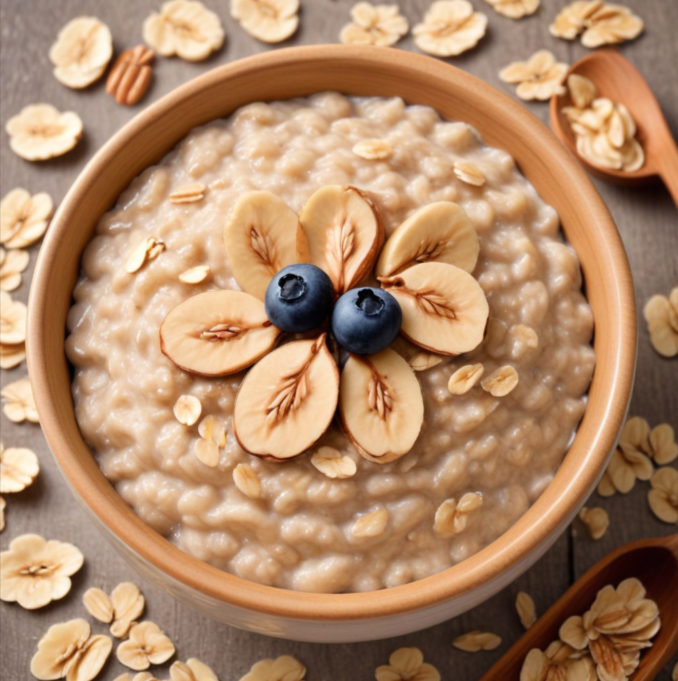Is Oatmeal Good for Constipation?
Are you looking for a natural solution to ease constipation? Look no further than oatmeal. This humble breakfast staple is not only delicious but can also provide relief from constipation.
Yes, oatmeal can help relieve constipation due to its high fiber content, aiding digestion and promoting regular bowel movements.
Packed with fiber, oatmeal acts as a gentle, natural laxative that can help regulate bowel movements and promote healthy digestion.
Whether you prefer it warm or overnight, oatmeal is a versatile option that can be easily incorporated into your diet.
Plus, it’s not just for breakfast! You can enjoy oatmeal at any time of the day, adding your favorite toppings for added flavor and nutrition.
So, if you’re tired of relying on harsh laxatives or uncomfortable remedies, why not give oatmeal a try?
It’s a simple and effective way to get your digestive system back on track. Say goodbye to constipation and hello to a healthier, happier you with the power of oatmeal.
Understanding Constipation and Its Causes
Constipation is a common digestive issue that affects millions of people worldwide. It is characterized by infrequent bowel movements, difficulty passing stools, and a feeling of incomplete evacuation.
There are several factors that can contribute to constipation, including a low-fiber diet, dehydration, lack of physical activity, certain medications, and underlying medical conditions.
When waste moves through the colon too slowly, too much water is absorbed, resulting in hard, dry stools that are difficult to pass. This is where oatmeal comes in.
What is Oatmeal and Its Nutritional Value?
Oatmeal is a type of porridge made from ground oats. It is a rich source of essential nutrients, including complex carbohydrates, fiber, protein, and various vitamins and minerals.
One cup of cooked oatmeal contains approximately 150 calories, 4 grams of fiber, and 6 grams of protein. Oatmeal is also low in fat and cholesterol-free.
It is a versatile food that can be enjoyed in various forms, such as rolled oats, steel-cut oats, instant oats, and oat bran.
The nutritional content of oatmeal makes it a healthy choice for maintaining overall well-being, including digestive health.
How Does Oatmeal Help with Constipation?
Oatmeal acts as a natural laxative due to its high fiber content. Fiber is an important nutrient that adds bulk to the stool and helps it move through the digestive system more efficiently.
There are two types of fiber: soluble and insoluble. Oatmeal contains both, making it an excellent choice for relieving constipation.
Soluble fiber absorbs water and forms a gel-like substance in the intestines, softening the stool and making it easier to pass.
Insoluble fiber, on the other hand, adds bulk to the stool and promotes regular bowel movements. By incorporating oatmeal into your diet, you can increase your fiber intake and improve your digestive health.
Oatmeal as a Source of Fiber
Fiber is an essential nutrient that plays a crucial role in maintaining a healthy digestive system. It helps prevent constipation by adding bulk to the stool, making it easier to pass.
Oatmeal is a great source of fiber, with one cup of cooked oatmeal providing approximately 4 grams of fiber. The recommended daily intake of fiber for adults is between 25 and 38 grams, depending on age and gender.
By including oatmeal in your diet, you can easily boost your fiber intake and promote regular bowel movements. Remember to increase your fiber intake gradually and drink plenty of water to prevent any discomfort.
Other Health Benefits of Oatmeal
In addition to its role in relieving constipation, oatmeal offers a range of other health benefits. It can help lower cholesterol levels, reduce the risk of heart disease, and regulate blood sugar levels.
The soluble fiber in oatmeal helps lower LDL (bad) cholesterol by reducing its absorption in the bloodstream. This, in turn, can help reduce the risk of heart disease.
Oatmeal also has a low glycemic index, meaning it does not cause a rapid spike in blood sugar levels. This makes it an ideal choice for individuals with diabetes or those looking to manage their blood sugar levels.
Different Ways to Incorporate Oatmeal in Your Diet
Oatmeal is a versatile ingredient that can be incorporated into your diet in various ways.
While it is commonly enjoyed as a warm breakfast cereal, there are many other ways to enjoy oatmeal throughout the day. Here are a few ideas:
Overnight oats: Mix rolled oats with your choice of milk, yogurt, and toppings such as fruits, nuts, and seeds. Let it sit in the refrigerator overnight for a quick and easy grab-and-go breakfast.
Oatmeal smoothie: Blend cooked oatmeal with your favorite fruits, milk or yogurt, and a handful of spinach or kale for a nutritious and filling smoothie.
Oatmeal pancakes or waffles: Substitute a portion of the flour in your pancake or waffle recipe with oatmeal for added fiber and nutrients.
Oatmeal cookies or bars: Use oats as the base for homemade cookies or energy bars, adding in your favorite mix-ins such as chocolate chips, dried fruits, or nuts.
Oatmeal as a topping: Sprinkle cooked oatmeal on top of yogurt, smoothie bowls, or desserts for an extra dose of fiber.
Preparing Oatmeal for Maximum Constipation Relief
To maximize the constipation-relieving benefits of oatmeal, there are a few tips to keep in mind when preparing and consuming it.
Firstly, opt for plain, unflavored oatmeal without added sugars or artificial ingredients. This will ensure that you are getting the most natural and nutritious form of oatmeal.
Secondly, avoid overcooking the oatmeal as it can become mushy and lose some of its fiber content. Cook it according to the instructions on the packaging for the best results.
Finally, be sure to drink plenty of water throughout the day to help the fiber in oatmeal do its job effectively.
Tips for Incorporating Oatmeal into a Balanced Diet
While oatmeal can be a beneficial addition to your diet, it is important to maintain a balanced and varied eating plan. Here are a few tips for incorporating oatmeal into a healthy, well-rounded diet:
- Pair oatmeal with protein: Add a source of protein such as Greek yogurt, nuts, or nut butter to your oatmeal to make it more satisfying and keep you feeling full for longer.
- Include a variety of fruits and vegetables: While oatmeal provides fiber, it is also important to consume a wide range of fruits and vegetables for optimal nutrition and fiber intake.
- Limit added sugars: Avoid adding excessive amounts of sugar, honey, or syrup to your oatmeal. Instead, sweeten it naturally with fruits or a small amount of maple syrup or honey.
- Experiment with flavors and toppings: Keep your oatmeal interesting by trying different flavor combinations and toppings such as cinnamon, vanilla extract, chopped nuts, dried fruits, or coconut flakes.
- Listen to your body: Pay attention to how your body reacts to oatmeal. While it is generally well-tolerated, some individuals may have sensitivities or allergies to oats. If you experience any adverse reactions, consult with a healthcare professional.
Other Foods That Can Help with Constipation
While oatmeal is an excellent choice for relieving constipation, there are other foods that can also help promote regular bowel movements.
Including a variety of fiber-rich foods in your diet can ensure a healthy digestive system. Some examples of high-fiber foods include whole grains, fruits, vegetables, legumes, and nuts.
Drinking plenty of water and staying physically active are also important factors in maintaining regular bowel movements.
If you are experiencing chronic or severe constipation, it is recommended to consult with a healthcare professional for further evaluation and guidance.
Conclusion
In conclusion, oatmeal is a nutritious and effective way to relieve constipation. Its high fiber content acts as a natural laxative, promoting regular bowel movements and easing the discomfort associated with constipation.
Whether enjoyed as a warm bowl of oatmeal or incorporated into various recipes, oatmeal is a versatile ingredient that can be easily integrated into your diet.
However, it is important to remember that everyone’s digestive system is unique, and what works for one person may not work for another.
If you have any concerns or underlying health conditions, it is always best to consult with a healthcare professional before making any significant changes to your diet.
With that said, oatmeal is certainly worth a try if you are looking for a natural and delicious way to support your digestive health. So go ahead, grab a bowl of oatmeal, and say goodbye to constipation!

